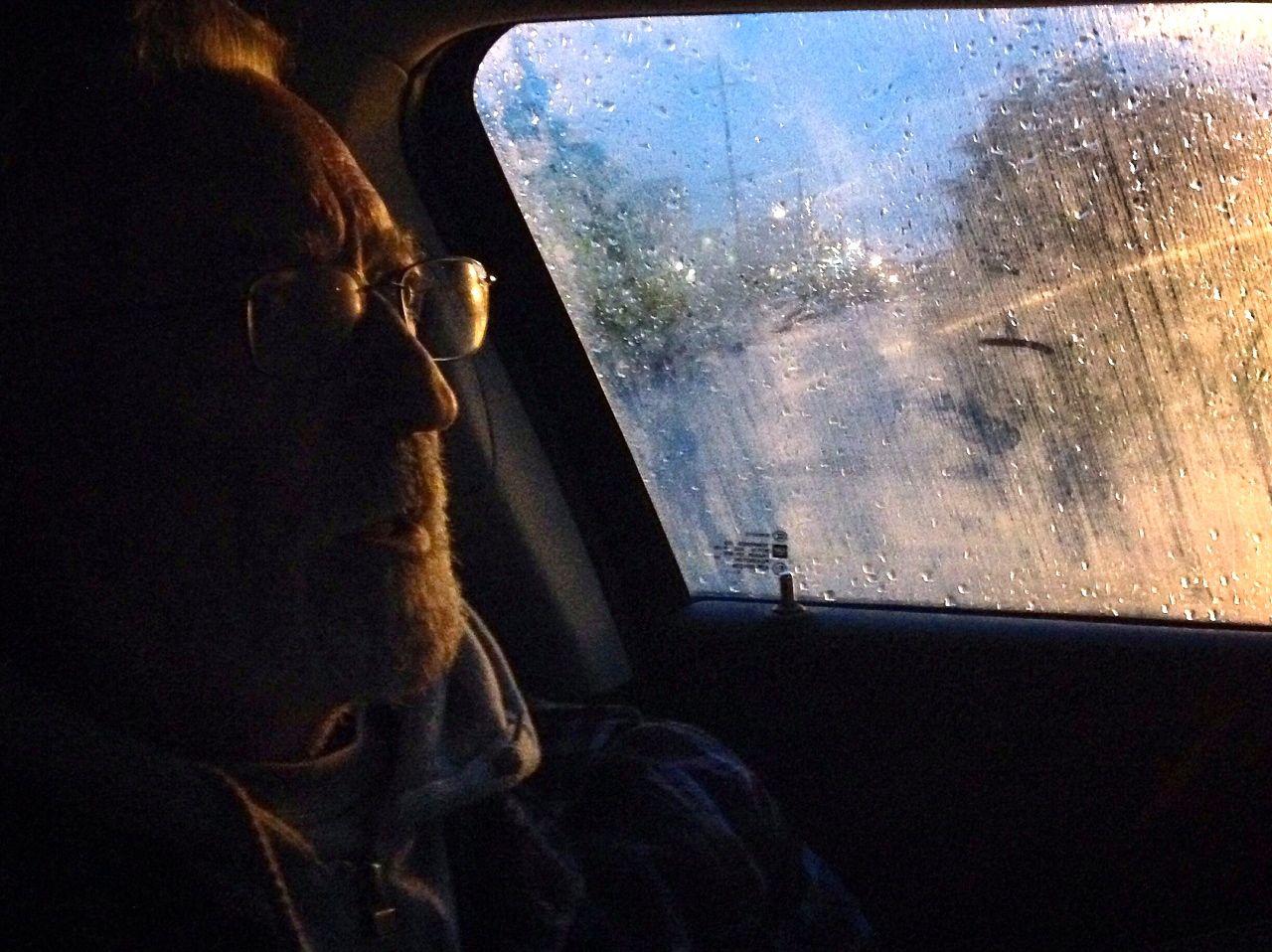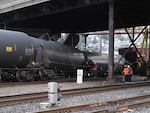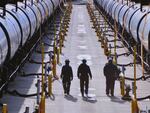
Dean Smith, who retired from the NSA, now tracks oil trains. He has gotten more information to the state in one week than oil companies have in three years.
Ashley Ahearn, KUOW/EarthFix
Dean Smith, 72, sits in his car by the tracks north of Seattle.
It's a dark, rainy Tuesday night, and Smith waits for an oil train to come through town. These trains are distinctive: A mile long, they haul 100 or so black, pill-shaped cars that each carry 30,000 gallons of crude oil.
Smith has been monitoring oil trains in his community for about a year, noting each one on a website he built. He does it because the railroads share little information about oil train traffic with Washington state. They don't have to because they're federally regulated.
What is known nationally: The railroads are moving 40 times more oil now than in 2008 due to an oil boom in the Bakken formation of North Dakota. Bakken crude oil contains high concentrations of volatile gas, with a flashpoint as low as 74 degrees Fahrenheit.
Derailments and explosions have occurred around North America since the oil boom began, including a 2013 catastrophe that killed 47 people in rural Quebec.
This has prompted emergency responders to call for more information from railroad companies about oil train traffic patterns and volumes. The railroads have mostly refused; they say that releasing that information could put them at a competitive disadvantage.
Which is why Smith decided to find out for himself. “It’s pretty hard to hide an oil train,” he says with a chuckle.
Last year, Smith launched the first
. He organized 30 volunteers to take shifts counting trains around the clock for a week.
In their first week of watching oil trains, the group collected more information about oil train traffic than the railroads had given Washington state in the three years the trains have come here.
"Information is power," Smith said. He should know: He used to work for the NSA.
State officials said Smith’s data is helpful, but insufficient. They said they shouldn’t have to rely on citizen volunteers to get critical information in case of disaster.
Dave Byers, the head of spill response for the state’s Department of Ecology, said his team needs the information to plan area-specific response strategies that protect the public and keep oil from getting into the environment.
“It gives us an idea of what the risk is, the routes that are taken,” Byers said. “The frequency and volume of oil really gives us an idea of what level of preparedness we need to be ready for in Washington state.”
Oil train traffic shows no signs of slowing, which adds to the state’s sense of urgency. The oil industry wants to build five new terminals in Washington state to move crude oil off trains and onto ships.
Meanwhile, Congress is considering legislation to lift a federal ban on exporting crude oil that’s been in place since 1975 – allowing American crude to be shipped around the world.
Close call in Seattle
Anyone who has attended a Mariners baseball game in downtown Seattle has likely seen or heard oil trains passing the ballpark. The trains continue north through the city to refineries on Puget Sound.
Seattle had a close call last year when an oil train derailed near downtown.
Ashley Ahearn jumped on her motorcycle to cover the derailment of an oil train in Seattle on July 24, 2014.
Byers and his team weren’t notified for an hour and a half and were not told initially there was oil in the derailed train cars.
No oil was spilled, but Byers is critical of how BNSF Railway, the company that moves most of the oil out of the Bakken oil fields, handled the situation.

Scene of an oil train derailment on July 24, 2014 in Seattle's Magnolia neighborhood.
Hayley Farless, WEC intern
BNSF did not tell the state there was highly flammable Bakken crude oil in the derailed train cars – that information came five hours later from the oil refinery waiting for the train. Additionally, Byers said that when his team arrived on scene, no BNSF representative was present, but welders were working on the derailed cars. The welders said they did not know there was crude oil inside.
“We became concerned because people were wandering off the street and taking selfies of themselves next to the railcars,” Byers said. “There was no preparing for the potential that one of those cars could actually start leaking.”
BNSF spokeswoman Courtney Wallace said in an emailed statement that the company had its hazardous materials team quickly in place to evaluate the situation. “This derailment did not cause a release at any point, nor was there a threat of a release,” she said.
The state and BNSF Railway have sparred over the company’s reporting practices of hazardous materials spills. Earlier this year,
state regulators released an investigation
and recommended that BNSF be fined up to $700,000 for not quickly reporting these spills. The company has disputed the state’s findings. A final decision is expected next year.

Workers prepare oil trains for unloading at the Tesoro Refinery north of Seattle.
Courtesy of Tesoro
Concern in Anacortes
This spring, several hundred people packed into the Anacortes City Hall for information from oil companies and BNSF Railway about the oil trains moving through their community. Just that morning, a BNSF oil train had derailed and caught fire in North Dakota.
In northern Puget Sound, Anacortes is home to two refineries that receive oil by rail from North Dakota.
Its residents, like others in small communities along the tracks in Washington state, have voiced concern about oil trains.
Audience members were allowed to submit written questions only – they could not speak. Oil refineries representatives told them about safety precautions at their facilities to prevent and respond to spills. They also talked about their commitment to getting newer oil train cars.

Courtney Wallace is a spokeswoman for BNSF Railway. The company believes that every derailment or accident is avoidable.
Ashley Ahearn, KUOW/EarthFix
Wallace, the BNSF spokeswoman, gave a presentation about the company’s commitment to safety. She said BNSF believes that every accident is preventable.
When pressed by a reporter about how much information BNSF shares with local emergency responders, Wallace said BNSF has “always provided information to first responders, emergency managers about what historically has moved through their towns.”
She cautioned that sharing regular updates or notifications of oil train movements could put the public at risk.
“We’re always cognizant of what information is shared, because we don’t want to see an incident that involves terrorism or anyone else who might have that kind of frame of mind,” Wallace said.
Fight for information
A federal emergency order demands that railroads share limited information with states – but state officials want more.
Washington state lawmakers passed a law recently that requires oil refineries, which are state-regulated, to give weekly notice of the train schedule to first responders.
State Rep. Jessyn Farrell, a Seattle Democrat who sponsored the bill, said BNSF and the oil industry opposed the legislation from the beginning.
“We’re going to get the information,” she said. “I don’t really care who gives it to us as long as it’s good information and it stands in court, because we need that information now.”
BNSF Railway spent more than $300,000 on lobbyists and political contributions in Washington state in 2014.

Jessyn Farrell is a Democrat in the Washington state House who has fought for legislation that would force oil refineries to share information about how much oil is arriving by rail.
Ashley Ahearn, KUOW/EarthFix
“I think they’re absolutely on the wrong side of this,” Farrell said. “In the public mind, and morally, they are absolutely wrong.”
BNSF’s Wallace said the company is still reviewing the law to see how federal regulatory authority will interact with state authority.
Back in Everett, Dean Smith says he isn't waiting for politicians or lawyers to duke this one out.
Instead he'll wait for trains, and he'll continue gathering information about them.
Four hours into a recent train watching shift, Smith perks up.
"There's something coming," he says. He opens the door of his Chevy Volt and steps into the rain. An orange BNSF engine emerges from the tunnel. Behind it are oil cars – about 100 of them, black as night.
The streetlight reflects off Smith's glasses and shadows gather in the furrow of his brow as he stands by the tracks, shoulders hunched.
"Sometimes I wonder, why fight it? Why not just move? That'd be the easiest thing to do," he says. "But I think we have to fight. And I would like to see citizens groups acting like this all over the country. That's the form of checks and balances we can create. All it takes is a few people."
This story is featured on the June episode of "Reveal," a new investigative public radio program and podcast produced by The Center for Investigative Reporting, a nonprofit newsroom based in California, and PRX. Subscribe to the podcast and learn more at www.revealnews.org.